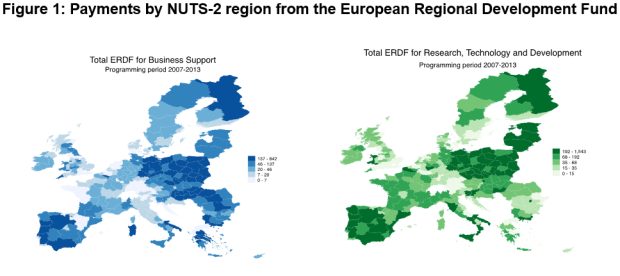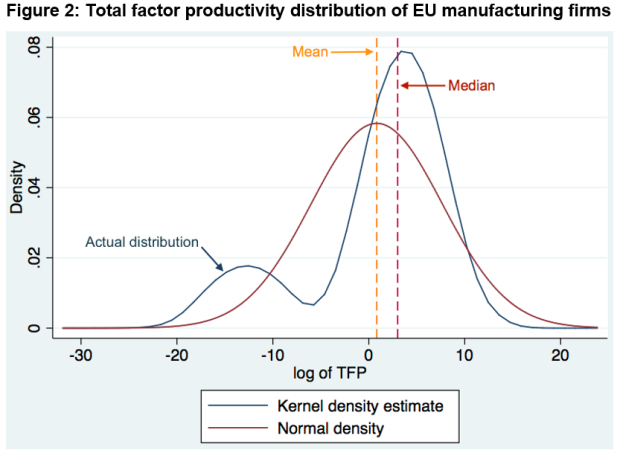EU cohesion policy has mixed results for firms’ productivity
By Loredana Fattorini, Mahdi Ghodsi, and Armando Rungi.
Photo: Production floor, Steve, CC-BY-SA 2.0
- European Regional Development Fund (ERDF) is one of the main functional tools of Regional policy, the second largest EU expenditure item, which aims to reduce regional economic disparities.
- Two firm-related ERDF thematic priorities are ‘Business support’ and ‘Research, Technology, and Development’ (RTD). Funding is allocated to stimulate research and innovation activities through investments in research centres, and to promote sustainable production, technology transfers and cooperation between businesses and the scientific community.
- A joint study by wiiw and IMT Lucca on the performance of manufacturing firms across the EU found that RTD funding has a positive and statistically significant impact on firms’ productivity growth, and that less efficient firms benefit most.
- Business support funding appears to have negative short-term effects on productivity, although a more positive picture may emerge over time.
In parallel with European integration, ‘cohesion policy’ has been developed to offset the imbalances that could benefit some 'core' EU regions at the expense of regions at its periphery. In the current financial period (2014-20), spending on regional policy amounts to almost a third of the EU budget (EUR 351.8 billion out of a total EUR 1,082 billion), and is the second largest expenditure item after the Common Agriculture Policy (CAP). Its aim is to reduce regional economic disparities resulting from geographic remoteness. In this respect, mutual support through transfers from richer to poorer regions aims to benefit economically and socially deprived regions and close the gap to the EU average.
Supporting firms with the European Regional Development Fund
One of the main financial tools of EU regional policy is the European Regional Development Fund (ERDF). Resources are allocated to regional operational programmes that have specified thematic priorities. For instance, the ERDF for Business support aims to help firms or groups of firms, in particular SMEs, with services and investments in innovation and sustainable production. Complementary to the latter, the ERDF for Research, Technology, and Development (RTD) stimulates research and innovation activities through investment in research centres, promoting technology transfers and cooperation between businesses and the scientific community.
Does the provision of EU funds have an effect on the productivity of firms?
In a joint study by wiiw and IMT Lucca, we assessed the impact of ‘cohesion policy’ on the performance of more than 273,500 manufacturing firms across the EU, after estimating their total factor productivities (TFPs) according to the most recent semi-parametric econometric technique proposed by Ackerberg et al. (2015). We assessed the short-term impact of both the Business support and the Research, Technology, and Development (RTD) financing from the ERDF on firm-level TFP growth in the 2007-15 period.

Note: values in EUR million. Source: Geography of Expenditure Final Report Work Package 13, wiiw and ISMERI EUROPA, 2015, own elaboration
Firm heterogeneity meets ‘cohesion policy’
We find a positive and statistically significant impact of RTD by ERDF on productivity growth. In fact, the firms that seem to benefit more from the RTD measure are the ones on the first quartile of the productivity distribution, i.e. the least efficient in a region. On the contrary, the ERDF Business support vehicle has a negative and statistically significant impact on productivity growth in the short term. Also in this case, the first quartile of the firms’ productivity distribution is where a stronger impact can be detected.
On the one hand, our results suggest that the aim of RTD is on average reached, as direct investments in R&D activities seem to improve overall firms’ performance, possibly thanks to developing new products and processes. On the other hand, a general Business support funding appears to have unintended consequences, although at this stage we cannot exclude that a positive future impact can still be revealed in the longer run, given the diverse priority themes.
Output data on the TFP estimations will soon be uploaded to the wiiw website.

